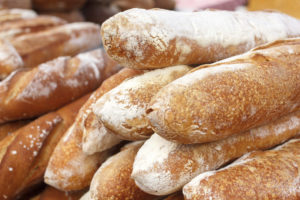
This article presents the harmful consequences of dogs consuming yeast-based bread dough.
Many people believe that raisins, chocolate, or macadamia nuts are the only dangerous foods for our furry friends when it comes to baking. What you might not realize is that yeast-based bread dough also presents a significant risk if our pets ingest it. Doughs that don’t contain yeast are less concerning but can still trigger gastrointestinal problems. This article presents the harmful consequences of dogs consuming yeast-based bread dough.
Why Is Yeast Dangerous to Eat for Dogs?
Yeast is a microscopic fungus that produces carbon dioxide gas and alcohol from sugar. This combination is ideal for baking bread because gas rises the dough, and ethanol flavors the bread before burning off in the oven. However, this process is dangerous when it happens in your pet’s tummy.
Since your pet’s stomach is moist and warm, it is the ideal environment for yeast to form and pump out CO2 and ethanol. The gas and rising dough buildup in the animal’s stomach is painful and may result in a medical condition known as gastric dilatation and volvulus, or GDV, bloat where the expanding tummy puts pressure on the surrounding areas.
Early Signs of Yeast Dough Ingestion
Bloat in dogs is an early sign of yeast dough ingestion. Your furry friend might attempt to vomit but not make anything or maybe just a little white foam. Other signs include an enlarged abdomen due to the buildup of dough and gas and increased heart rate, collapse, and weakness. Other signs of dough ingestion from your pet are smelling alcohol on their breath. Your pet might appear drunk, becoming disoriented and uncoordinated. They might also feel cold to the touch.
What Can Pet Owners Do?
If your pet experiences the above symptoms after ingesting yeast-based bread dough, get to a veterinarian immediately. This could be a life-threatening emergency. Your vet might attempt to induce vomiting to eliminate the dough from your pet’s tummy. Since bread dough is sticky, it’s hard to vomit, so other removal methods will likely be necessary.
Yeast enjoys the warmth of a stomach, so making the tummy cold may slow the yeast’s growth and the formation of alcohol and gas. This can occur by feeding your pet ice chips or flushing the tummy with cold water. In rare cases, the dough might be surgically removed.
Prognosis
Dogs typically do excellent if the yeast dough is eliminated quickly and they are treated after ingestion. Unfortunately, pets experiencing severe alcohol poisoning, GDV, or bloat have a more guarded prognosis. Avoid letting your pets access raw yeast dough to prevent this fatal situation.
Support Your Pet’s Wellness at Alexander Animal Hospital
Alexander Animal Hospital is a full-service animal hospital located in Severna Park, Maryland, serving the Severna Park, Pasadena, and Arnold Areas. Our goal is educating clients on the needs of their pets and understanding the importance of individualized veterinary care in order to strengthen the human-animal bond between owners and their pets.
We understand you have a choice when deciding on the care for your pets, and we strive to provide you with unparalleled services including wellness exams, vaccines, lost pet microchip ID, dental care, surgical services, digital radiography, and in-hospital laboratory services and diagnostics. Other highlights of Alexander Animal Hospital are the separate cat and dog waiting and exam rooms, as well as after-hours on-call emergency services.
Please take a look around our website and then give us a call at 410-777-8678 to set up an appointment. We’re social! Follow us on Facebook, Twitter, and Pinterest for all the latest updates!
